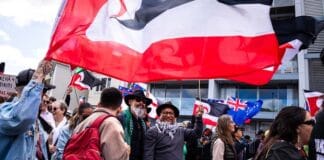THE WIDESPREAD acclaim for The Australian journalist Paul Toohey’s Last Drinks: The Impact of the Northern Territory Intervention (Quarterly Essay 30, June 2008), demonstrates just how deeply racist attitudes to Aboriginal people are embedded in Australian politics and culture.
Toohey’s work is both grossly offensive and riddled with contradictions. The Racial Discrimination Act 1975 no longer operates in communities “prescribed” under the intervention. Reading the essay you could believe it doesn’t operate anywhere.
In the opening passages of the essay, Toohey discusses Aboriginal work patterns. “A Territory government staffer was trying to understand the impasse… ‘the reason’s simple: they’re lazy’. There was no point beating around the bush—he was right”.
One section entitled Wogarigines compares Greek and Aboriginal extended families concluding, “It was all very charming, of course, if you were roasting forequarter goat sections on the spit as Mikis Theodorakis tunes jangled… In Alice Springs you were more likely to be working your way through four litres of Fruity Gordo on a hot day and coming to the conclusion that your wife was a slut who needed a sharp tree branch in the head. And where were the kids?”
Supposedly drawing on his experiences or conversations with “old friends” in Aboriginal communities, the essay has an insidious edge as Toohey tries to portray himself as someone who knows the “real story”.
The liberal radio host Phillip Adams fell for it, claiming that there is “no-one better” to comment on the Intervention, “commending… this deeply disturbing essay” to his audience during a recent interview with Toohey.
Toohey criticises previous Country Liberal Party NT governments for leaving the “bush to rot”, while “stadiums and convention centres” were built in the city. But these echo the same accusations Mal Brough used to divert attention from the years of funding cuts by the Howard government
Interestingly, Brough is accused of using the issue of child abuse to push through the policy, “Sex, good or bad, sold”.
But this is justification masquerading as critique. Toohey’s article is ardently pro-Intervention. Brough may be an “insensitive thug”, but his approach is “necessary”. Welfare quarantining is praised for protecting women from “men stealing their money for beer”.
Despite his criticism of Brough using sex to sell the Intervention, Toohey himself consistently racialises sexual violence. Immediately following a paragraph about the beauty of an Aboriginal cultural ceremony he mistakenly drove into is one that blames culture for alleged acceptance of child rape. Toohey says, “Family also meant forgiveness. For just about anything”.
He graphically describes the rape of a young boy by others his age in Maningrida. He blames the rape on “arrogant fathers who’d encouraged their children to believe they were only answerable to Aboriginal law”. During the Phillip Adams’ interview, Toohey described the rape as “unprecedented”, despite its overwhelming similarity to a number of cases of abuse in elite Sydney boarding schools over the past decade.
Toohey, like Minister Jenny Macklin, informs us that income management is “supported by mothers and grandmothers.” However, for all his claimed contact with the “grass-roots”, the only pro-quarantine women he specifically refers to are from Hermansburg. The same three women were also the pro-Intervention speakers on SBS’s Insight program. One of them, Mavis Malbunka, is now part of the Labor government’s “review” panel and spoke alongside Mal Brough at the Bennelong Society’s recent conference.
There is no mention in Toohey’s essay of the 500 strong rally in Alice Springs in July 2007, led by Aboriginal women who burned a copy of the Intervention legislation; nor the 100 strong meeting of women from “prescribed areas” held in August 2007 that voted unanimously for repeal of the laws.
By positioning himself as defender of “the women and children who are suffering the most”, Toohey wraps himself in the same pretence that has been used to justify the whole Intervention. In reality, the Intervention has made life far harder for women in prescribed areas. In surveys carried out by activists in Darwin and Alice Springs of more than 150 people under income management, more than 90 per cent of women opposed the measures.
In the closing sections of his essay Toohey laments the “death” of the Intervention—which he identifies with the reintroduction of CDEP and suspected softening of the welfare quarantine under Labor. In reality Labor continues to roll out the quarantine even as the Intervention shifts into a new phase. They are using not only the shock treatment of the income quarantines, but also the explicit denial of resources in an attempt to force people to leave communities assessed as “unviable”.
Paul Toohey’s disgraceful essay puts him firmly alongside Keith Windschuttle as an ideological hired-gun and apologist for the on-going dispossession of Aboriginal people.
By Paddy Gibson





